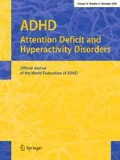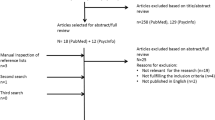Abstract
There is a debate how different ADHD cases with a comorbid sluggish cognitive tempo (SCT) phenotype are from subjects with a pure inattentive ADHD presentation (ADHD-restrictive inattentive presentation). In this study, 214 patients aged 8–15 years from an ADHD outpatient clinic were assessed, and 100 typically developing controls (TD) were recruited as comparisons. No psychiatric comorbidities except for oppositional defiant disorder were allowed. We compared 29 cases with ADHD + SCT with 34 ADHD-RI cases and 92 TD subjects on sociodemographic profiles, CBCL subscales scores and neurocognitive findings. Regarding sociodemographic profiles (age, gender and parental education) and CBCL subscales, ADHD + SCT and ADHD-RI cases did not differ in any score (all p > 0.05). Comparing with SCT cases, ADHD-RI cases presented slower psychomotor speed and worse neurocognitive index (p < 0.001). We found that only SCT was independently associated with a lower performance in total memory score. ADHD-RI was independently associated with longer reaction time. Our findings suggest that although SCT might be expected to present longer reaction time, we found that slower psychomotor speed and longer reaction time scores were related to inattention. Overall, SCT and ADHD-RI groups were distinguished by differential associations with measures of memory and reaction time.

Similar content being viewed by others
References
Achenbach TM (1991) Manual for the child behavior checklist. Burlington (Vt), 7
APA (1994) Diagnostic and statistical manual of mental disorders, 4th edn. APA, Philadelphia
Araujo Jimenez EA, Jane Ballabriga MC, Bonillo Martin A, Arrufat FJ, Serra Giacobo R (2015) Executive functioning in children and adolescents with symptoms of sluggish cognitive tempo and ADHD. J Atten Disord 19(6):507–514
Barkley RA (2013) Distinguishing sluggish cognitive tempo from ADHD in children and adolescents: executive functioning, impairment, and comorbidity. J Clin Child Adolesc Psychol 42(2):161–173
Bauermeister JJ, Barkley RA, Martinez JV, Cumba E, Ramirez RR, Reina G et al (2005a) Time estimation and performance on reproduction tasks in subtypes of children with attention deficit hyperactivity disorder. J Clin Child Adolesc Psychol 34(1):151–162
Bauermeister JJ, Matos M, Reina G, Salas CC, Martinez JV, Cumba E, Barkley RA (2005b) Comparison of the DSM-IV combined and inattentive types of ADHD in a school-based sample of Latino/Hispanic children. J Child Psychol Psychiatry 46(2):166–179
Bauermeister JAJ, Barkley RA, Bauermeister JAJ, Martinez JV, McBurnett K (2012) Validity of the sluggish cognitive tempo, inattention, and hyperactivity symptom dimensions: neuropsychological and psychosocial correlates. J Abnorm Child Psychol 40(5):683–697
Becker SP, Langberg JM (2013) Sluggish cognitive tempo among young adolescents with ADHD: relations to mental health, academic, and social functioning. J Atten Disord 17(8):681–689
Becker SP, Leopold DR, Burns GL, Jarrett MA, Langberg JM, Marshall SA et al (2016) The internal, external, and diagnostic validity of sluggish cognitive tempo: a meta-analysis and critical review. J Am Acad Child Adolesc Psychiatry 55(3):163–178
Belmar M, Servera M, Becker SP, Burns GL (2015) Validity of sluggish cognitive tempo in South America: an initial examination using mother and teacher ratings of chilean children. J Atten Disord 5:1087054715597470
Biederman J, Faraone SV, Doyle A, Lehman BK, Kraus I, Perrin J, Tsuang MT (1993) Convergence of the Child Behavior Checklist with structured interview-based psychiatric diagnoses of ADHD children with and without comorbidity. J Child Psychol Psychiatry 34(7):1241–1251
Biederman J, Faraone S, Mick E, Moore P, Lelon E (1996) Child behavior checklist findings further support comorbidity between ADHD and major depression in a referred sample. J Am Acad Child Adolesc Psychiatry 35(6):734–742
Burns GL, Servera M, Bernad Mdel M, Carrillo JM, Cardo E (2013) Distinctions between sluggish cognitive tempo, ADHD-IN, and depression symptom dimensions in Spanish first-grade children. J Clin Child Adolesc Psychol 42(6):796–808
Camprodon-Rosanas E, Batlle S, Estrada-Prat X, Acena-Diaz M, Petrizan-Aleman A, Pujals E et al (2016) Sluggish cognitive tempo in a child and adolescent clinical outpatient setting. J Psychiatr Pract 22(5):355–362. https://doi.org/10.1097/PRA.0000000000000177
Camprodon-Rosanas E, Ribas-Fitó N, Batlle-Vila S, Persavento C, Alvarez-Pedrerol M, Sunyer J, Forns J (2017) Sluggish cognitive tempo: sociodemographic, behavioral, and clinical characteristics in a population of catalan school children. J Atten Disord 21(8):632–641. https://doi.org/10.1177/1087054716652477
Capdevila-Brophy C, Artigas-Pallares J, Navarro-Pastor JB, Garcia-Nonell K, Rigau-Ratera E, Obiols JE (2014) ADHD predominantly inattentive subtype with high sluggish cognitive tempo: a new clinical entity? J Atten Disord 18(7):607–616
Carlson CL, Mann M (2002) Sluggish cognitive tempo predicts a different pattern of impairment in the attention deficit hyperactivity disorder, predominantly inattentive type. J Clin Child Adolesc Psychol 31(1):123–129. https://doi.org/10.1207/S15374424JCCP3101_14
Castellanos FX, Sonuga-Barke EJS, Scheres A, Di Martino A, Hyde C, Walters JR (2005) Varieties of attention-deficit/hyperactivity disorder-related intra-individual variability. Biol Psychiatry 57(11):1416–1423. https://doi.org/10.1016/j.biopsych.2004.12.005
DuPaul GJ, Ervin RA, Hook CL, McGoey KE (1998) Peer tutoring for children with attention deficit hyperactivity disorder: effects on classroom behavior and academic performance. J Appl Behav Anal 31(4):579–592
Ercan ES, Amado S, Somer OÇS (2001) Development of a test battery for the assessment of attention deficit hyperactivity disorder. Turk J Child Adolesc Ment Health 8:132–144
Ercan ES, Suren S, Bacanli A, Yazici KU, Calli C, Ozyurt O et al (2016) Decreasing ADHD phenotypic heterogeneity: searching for neurobiological underpinnings of the restrictive inattentive phenotype. Eur Child Adolesc Psychiatry 25(3):273–282
Erol N, Arslan BL, Aakin M (1995) The adaptation and standardization of the Child Behavior Checklist among 6–18 year-old Turkish children. In: Sergeant J (ed) Eunethydis: European Approaches to Hyperkinetic Disorder, pp 97–113
Garner AA, Marceaux JC, Mrug S, Patterson C, Hodgens B (2010) Dimensions and correlates of attention deficit/hyperactivity disorder and Sluggish Cognitive Tempo. J Abnorm Child Psychol 38(8):1097–1107. https://doi.org/10.1007/s10802-010-9436-8
Gökler B, Ünal F, Pehlivantürk B, Kültür EC, Akdemir DTY (2004) Reliability and validity of Schedule for Affective Disorders and Schizophrenia for School-Age Children-Present and Lifetime Version-Turkish Version (K-SADS-PL-T) [in Turkish]. Turk J Child Adolesc Ment Health 11:109–116
Gualtieri CT, Johnson LG (2006) Reliability and validity of a computerized neurocognitive test battery, CNS Vital Signs. Arch Clin Neuropsychol 21(7):623–643
Guerts HM, Verte S, Oosterlaan J, Roeyers HSJ (2005) ADHD subtypes: Do they differ in their executive functioning profile? Arch Clin Neuropsychol Title 20:457–477
Harrington KM, Waldman ID (2010) Evaluating the utility of sluggish cognitive tempo in discriminating among DSM-IV ADHD subtypes. J Abnorm Child Psychol 38(2):173–184. https://doi.org/10.1007/s10802-009-9355-8
Hartman CA, Willcutt EG, Rhee SH, Pennington BF (2004) The relation between sluggish cognitive tempo and DSM-IV ADHD. J Abnorm Child Psychol 32(5):491–503
Huang-Pollock CL, Nigg JT, Carr TH (2005) Deficient attention is hard to find: applying the perceptual load model of selective attention to attention deficit hyperactivity disorder subtypes. J Child Psychol Psychiatry 46(11):1211–1218
Jacobson LA, Geist M, Mahone EM (2018) Sluggish cognitive tempo, processing speed, and internalizing symptoms: the moderating effect of age. J Abnorm Child Psychol 46(1):127–135. https://doi.org/10.1007/s10802-017-0281-x
Jarrett MA, Rapport HF, Rondon AT, Becker SP (2014) ADHD dimensions and sluggish cognitive tempo symptoms in relation to self-report and laboratory measures of neuropsychological functioning in college students. J Atten Disord 16:1087054714560821
Kaufman J, Birmaher B, Brent D, Rao U, Flynn C, Moreci P et al (1997) Schedule for affective disorders and schizophrenia for school-age children-present and lifetime version (K-SADS-PL): initial reliability and validity data. J Am Acad Child Adolesc Psychiatry 36(7):980–988
Lee S, Burns GL, Snell J, McBurnett K (2014) Validity of the sluggish cognitive tempo symptom dimension in children: sluggish cognitive tempo and ADHD-inattention as distinct symptom dimensions. J Abnorm Child Psychol 42(1):7–19
Ludwig HT, Matte B, Katz B, Rohde LA (2009) Do sluggish cognitive tempo symptoms predict response to methylphenidate in patients with attention-deficit/hyperactivity disorder-inattentive type? J Child Adolesc Psychopharmacol 19(4):461–465
Magnusson P, Smari J, Gretarsdottir H, Prandardottir H (1999) Attention-Deficit/Hyperactivity symptoms in Icelandic schoolchildren: assessment with the Attention Deficit/Hyperactivity Rating Scale-IV. Scand J Psychol 40(4):301–306
Marshall SA, Evans SW, Eiraldi RB, Becker SP, Power TJ (2014) Social and academic impairment in youth with ADHD, predominately inattentive type and sluggish cognitive tempo. J Abnorm Child Psychol 42(1):77–90
McBurnett K, Pfiffner LJ, Frick PJ (2001) Symptom properties as a function of ADHD type: an argument for continued study of sluggish cognitive tempo. J Abnorm Child Psychol 29(3):207–213
Penny AM, Waschbusch DA, Klein RM, Corkum P, Eskes G (2009) Developing a measure of sluggish cognitive tempo for children: content validity, factor structure, and reliability. Psychol Assess 21(3):380–389
Polanczyk GV, Salum GA, Sugaya LS, Caye A, Rohde LA (2015) Annual research review: a meta-analysis of the worldwide prevalence of mental disorders in children and adolescents. J Child Psychol Psychiatry 56(3):345–365
Raiker JS, Greening L, Stoppelbein L, Becker SP, Fite PJ, Luebbe AM (2015) Mediating effect of psychopathy on the risk of social problems among children with ADHD versus sluggish cognitive tempo symptoms. Child Psychiatry Hum Dev 46(4):523–532
Rondon AT, Hilton DC, Jarrett MA, Ollendick TH (2018) Sleep, internalizing problems, and social withdrawal: unique associations in clinic-referred youth with elevated sluggish cognitive tempo symptoms. J Atten Disord. https://doi.org/10.1177/1087054718756197
Salum GA, Gadelha A, Pan PM, Moriyama TS, Graeff-Martins AS, Tamanaha AC et al (2015) High risk cohort study for psychiatric disorders in childhood: rationale, design, methods and preliminary results. Int J Methods Psychiatr Res 24(1):58–73
Servera M, Bernad MD, Carrillo JM, Collado S, Burns GL (2016) Longitudinal correlates of sluggish cognitive tempo and ADHD-inattention symptom dimensions with Spanish children. J Clin Child Adolesc Psychol 45(5):632–641
Skirbekk B, Hansen BH, Oerbeck B, Kristensen H (2011) The relationship between sluggish cognitive tempo, subtypes of attention-deficit/hyperactivity disorder, and anxiety disorders. J Abnorm Child Psychol 39(4):513–525
Tamm L, Garner AA, Loren REA, Epstein JN, Vaughn AJ, Ciesielski HA, Becker SP (2016) Slow sluggish cognitive tempo symptoms are associated with poorer academic performance in children with ADHD. Psychiatry Res 242:251–259. https://doi.org/10.1016/j.psychres.2016.05.054
Todd RD, Rasmussen ER, Wood C, Levy F, Hay DA (2004) Should sluggish cognitive tempo symptoms be included in the diagnosis of attention-deficit/hyperactivity disorder? J Am Acad Child Adolesc Psychiatry 43(5):588–597. https://doi.org/10.1097/00004583-200405000-00012
Wahlstedt C (2009) Neuropsychological deficits in relation to symptoms of ADHD: independent contributions and interactions. Child Neuropsychol 15(3):262–279. https://doi.org/10.1080/09297040802524198
Wahlstedt C, Bohlin G (2010) DSM-IV-defined inattention and sluggish cognitive tempo: independent and interactive relations to neuropsychological factors and comorbidity. Child Neuropsychol 16(4):350–365. https://doi.org/10.1080/09297041003671176
Willcutt EG, Chhabildas N, Kinnear M, DeFries JC, Olson RK, Leopold DR et al (2014) The internal and external validity of sluggish cognitive tempo and its relation with DSM-IV ADHD. J Abnorm Child Psychol 42(1):21–35
Wood WLM, Potts HE, Lewandowski LJ, Lovett BJ (2017) Sluggish cognitive tempo and speed of performance. J Atten Disord 21(8):684–690. https://doi.org/10.1177/1087054716666322
Author information
Authors and Affiliations
Corresponding author
Ethics declarations
Conflict of interest
Eyüp Sabri Ercan is on advisory boards for Sanofi Turkey. Luis A. Rohde has received honoraria, has been on the speakers’ bureau/advisory board and/or has acted as a consultant for Eli-Lilly, Janssen-Cilag, Medice, Novartis and Shire in the last three years. He receives authorship royalties from Oxford Press and ArtMed. He also received travel awards for taking part of 2014 APA and 2015 WFADHD meetings from Shire and 2016 AACAP meeting from Novartis. The ADHD and Juvenile Bipolar Disorder Outpatient Programs chaired by him received unrestricted educational and research support from the following pharmaceutical companies in the last three years: Eli-Lilly, Janssen-Cilag, Novartis and Shire. Gül Ünsel Bolat received travel award for taking part of 2018 Turkish Child and Adolescent Psychiatry Congress from Sanofi. The other authors declare that they have no conflict of interest.
Ethical approval
All procedures performed in studies involving human participants were in accordance with the ethical standards of the institutional and/or national research committee and with the 1964 Helsinki Declaration and its later amendments or comparable ethical standards.
Informed consent
Informed consent was obtained from all individual participants included in the study.
Additional information
Publisher's Note
Springer Nature remains neutral with regard to jurisdictional claims in published maps and institutional affiliations.
Rights and permissions
About this article
Cite this article
Ünsel-Bolat, G., Ercan, E.S., Bolat, H. et al. Comparisons between sluggish cognitive tempo and ADHD-restrictive inattentive presentation phenotypes in a clinical ADHD sample. ADHD Atten Def Hyp Disord 11, 363–372 (2019). https://doi.org/10.1007/s12402-019-00301-y
Received:
Accepted:
Published:
Issue Date:
DOI: https://doi.org/10.1007/s12402-019-00301-y




